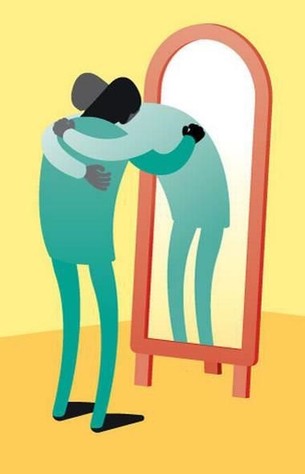|
According to research by the psychologist Jean Twenge and others, depressive symptoms in teen girls increased by 50 percent between 2012 and 2015, and 21 percent in boys. The number of college students experiencing “overwhelming anxiety” increased to 62 percent in 2016 from 50 percent in 2011. Enter self-compassion. First measured by Kristin Neff of the University of Texas at Austin, the trait has been shown by researchers to ease symptoms of psychopathology in adults, while bolstering motivation and high performance standards. In other words, you can be nice to yourself and succeed, absent the Netflix and pajamas. Late last year, Imogen Marsh, Stella Chan and Angus Macbeth at the University of Edinburgh published a meta-analysis of research on self-compassion in young people in the journal Mindfulness. They synthesized studies on more than 7,000 adolescents from six countries, ranging in age from 10 to 19. They found that teens with high levels of the trait were most likely to report lower levels of distress caused by anxiety and depression — especially when facing chronic academic stress. Adolescence is a developmental moment of peak stress, and a teen’s heightened self-consciousness (“Do I look weird? Did I just sound stupid in class?”) cranks up the volume of the inner critic. Self-compassion encourages mindfulness, or noticing your feelings without judgment; self-kindness, or talking to yourself in a soothing way; and common humanity, or thinking about how others might be suffering similarly. This last step is particularly salubrious for adolescents: Many believe that “I’m the only one going through this,” which exacerbates feelings of isolation and shame. The teens I work with are prone to catastrophizing when facing a problem (“I’ll never get into college,” “I’ll never get a good job”). For them, the mindfulness step of self-compassion — which asks them to zero in on a feeling instead of an imagined, exaggerated outcome — is especially grounding. My students find self-kindness most challenging, so I ask them to imagine how they would comfort a close friend struggling with the same challenge. “There’s almost no one whom we treat as badly as ourselves,” Dr. Neff told me. But research shows that self-compassion does not diminish integrity or standards of accountability. Instead, it lets you own up to a tough moment without paying for it with your self-worth. This new logic teaches students that they don’t have to be perfect to be worthy.
I have been stunned by the reaction of students of all ages to the practice. In a public high school auditorium in Hopewell Valley, N.J., in November, I led more than 600 juniors and seniors through a self-compassion meditation. I asked them to place their hands on their hearts, and to feel the pressure and warmth of a kind hand. Their silence was respectful and profound. Many students were crying. They had never thought to approach their own setbacks with gentleness. Late last year the first self-compassion curriculum for teens, “Making Friends With Yourself: A Mindful Self-Compassion Program for Teens and Young Adults,” was developed by Karen Bluth, assistant professor at the University of North Carolina’s School of Medicine, and Lorraine Hobbs, director of the youth and family programs at the University of California San Diego Center for Mindfulness. Inspired by a similar curriculum for adults created by Dr. Neff and the psychologist Christopher Germer, the program’s evaluations revealed lowered stress in middle and high school participants, compared with those in a control group. Participants also had lower anxiety and depression, and elevated resilience and healthy risk taking. To teach their children how to show themselves grace in the face of a challenge, I coach parents to model self-compassion in the face of everyday setbacks. Instead of cursing at yourself when you lose your keys, verbalize mindfulness: “I am feeling so frustrated right now.” When describing a disappointment at work, demonstrate what self-kindness sounds like: “I did my best, and I’ll make sure not to make that mistake next time.” When you burn dinner, recognize common humanity: “Well, I’m pretty sure I’m not the only bummed out parent feeding their kids pizza tonight.” If more students use self-compassion to reframe their failures, they may discover more nourishing sources of motivation and healthier strategies to pursue their goals. Rachel Simmons is co-founder of Girls Leadership and the author of “Enough As She Is: How to Help Girls Move Past Impossible Standards of Success to Live Healthy, Happy, and Fulfilling Lives.”
0 Comments
Your comment will be posted after it is approved.
Leave a Reply. |
Disclaimer: This website is for informational and educational purposes.
Any and all blog content represents a synthesis of empirical information found on the internet, of my own personal opinions, and my professional experiences. Nothing posted reflects or should be considered professional advice. Interaction with me via the blog does not constitute a professional or therapeutic relationship. For professional and customized advice, you should seek the services of a licensed mental healthcare professional. I do not assume liability for any portion or content of material on the blog and accept no liability for damage or injury resulting from your decision to interact with the website. Archives
August 2022
Categories
All
|
